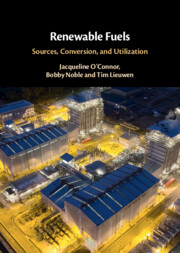Book contents
- Frontmatter
- Contents
- Contributors
- Preface
- Part I Users and Conversion Devices
- 1 Aero Gas Turbines
- 2 Ground-Based Gas Turbines
- 3 Reciprocating Engines
- 4 Process Heaters
- 5 Fuel Cells and Hydrogen Production
- Part II Chemical Energy Carriers
- 6 Syngas and Biogas
- 7 Liquid Fuel Synthesis
- 8 Ammonia
- 9 Metal Fuels
- 10 Bio-based Solid Fuels
- Part III Fundamental Combustion Processes
- 11 Fundamentals of Gaseous Combustion
- 12 Liquid Fuel Atomization and Combustion
- 13 Pollutant Emissions of Alternative Fuels
- Part IV Case Studies
- 14 Certification of Drop-In Alternative Fuels for Aviation
- 15 Fuel Composition Influences on Reciprocating Engine Performance
- 16 Near-Zero- and Zero-Carbon Fuels in Industrial Gas Turbines
- 17 Hydrogen Solutions for Net-Zero Power Generation
- Index
9 - Metal Fuels
from Part II - Chemical Energy Carriers
Published online by Cambridge University Press: 01 December 2022
- Frontmatter
- Contents
- Contributors
- Preface
- Part I Users and Conversion Devices
- 1 Aero Gas Turbines
- 2 Ground-Based Gas Turbines
- 3 Reciprocating Engines
- 4 Process Heaters
- 5 Fuel Cells and Hydrogen Production
- Part II Chemical Energy Carriers
- 6 Syngas and Biogas
- 7 Liquid Fuel Synthesis
- 8 Ammonia
- 9 Metal Fuels
- 10 Bio-based Solid Fuels
- Part III Fundamental Combustion Processes
- 11 Fundamentals of Gaseous Combustion
- 12 Liquid Fuel Atomization and Combustion
- 13 Pollutant Emissions of Alternative Fuels
- Part IV Case Studies
- 14 Certification of Drop-In Alternative Fuels for Aviation
- 15 Fuel Composition Influences on Reciprocating Engine Performance
- 16 Near-Zero- and Zero-Carbon Fuels in Industrial Gas Turbines
- 17 Hydrogen Solutions for Net-Zero Power Generation
- Index
Summary
In the search for carbon-free renewable and sustainable fuels, an underexplored option is the use of metals as recyclable energy carriers. Metals can be produced via electrolytic processes at efficiencies comparable to hydrogen- or carbon-based carriers; metals are energy-dense and stable solids that are easy to transport and store. The key limitation to the use of metals as recyclable fuels is the lack of any mature technology for power generation using metal fuels. This chapter will review the overall concept of metals as recyclable fuels, discuss the possible options for metal-fueled power-generation systems, and identify the remaining science and technology gaps.
- Type
- Chapter
- Information
- Renewable FuelsSources, Conversion, and Utilization, pp. 275 - 328Publisher: Cambridge University PressPrint publication year: 2022
- 1
- Cited by

